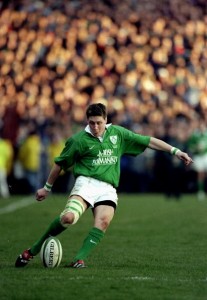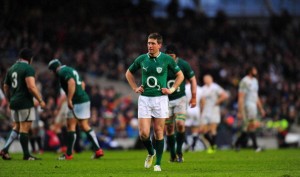
Man in the moment: Ronan O'Gara in 2009, celebrating the drop goal that won the Triple Crown against Wales
By Alan Dymock
THE FIRST, fast, now ethos of modern media means that you are furnished with soundbites and breaking news at breakneck speed. However, aside from endless repetition and retweets, we are all at risk of forgetting anything more than a month back because we are always straining our eyes to look ahead.
So when Ronan O’Gara was left out of this weeks Ireland RBS 6 Nations squad everyone lurched forward, rather than looking back or stopping to let him have his say, or even considering that he could play for Ireland in the coming weeks due to injuries. With Jonathan Sexton injured and Paddy Jackson struggling, O’Gara could still be an Irish AN O’Ther.
When he was first dropped, though, everyone immediately assumed that he would retire. Not that he could still feasibly wear green again. The jig would be up. So long, and thanks for all the kicks. Quick. Who’s next?
Deference will undoubtedly be paid when everything settles down, but up to this point it has been speculation founded on international careers gone by. Players play; get dropped; bow out. That’s the perceived natural order of things, or so we’re told, and it would be awfully convenient for everyone if it would remain thus for the foreseeable future, thanks very much.
Yet Ronan O’Gara, despite appearing for most of his career to have a default setting whereby he could line up a touch finder or slide-rule a penalty kick with no fuss at all, has rarely had a predictable life in rugby.
His is a career in which the fat lady has not yet sung, despite the chatter. He is still revered in Munster, having famously booted them beyond Biarritz in the 2006 Heineken Cup final, and he did so again in 2008, this time against Toulouse. If he never pulls on a green jersey again, he can still prowl around Thomond Park for the good of his province.
The risk at times like this is to assume he will limp off the scene, so everyone must eulogise, you know, ‘balance be damned, we’re toasting a great’. However, it is fairer, and indeed more respectful, to look at the blemishes as well as the achievements.
For Ireland, O’Gara has been as near to constant as a professional in a contact sport can get. He is 36 this week, but has amassed a whopping 128 caps. In the Six Nations he has appeared more than anyone else, 61 times, and has scored more points than anyone else, chalking up 551 points. He has been on tour with the Lions to Australia in 2001, New Zealand in 2005 and South Africa in 2009.
There have been lows, of course. Despite the Grand Slam winning kicks of 2009 or the record breaking appearances in World Cups, there have always been questions about O’Gara’s temperament or his dedication to the tackle. He was charged down by prop Gethin Jenkins during the 2005 decider with Wales and he was unceremoniously sat down by Rodrigo Roncero in 2008, something that has happened intermittently throughout his time on the turf. His rush of blood, kick and mid-air hit against the Springboks in ’09 was another lowlight. There have been criticisms that he sat too deep, threw too many risky passes, never made breaks.
For all of this, though there are highlights. His try against France in the Croke corner in 2007. His performances in wins against Australia, 2002, South Africa and Argentina, 2004, and the 2009 Triple Crown.
It is also pertinent to forget the stories about him being too keen on a punt and the hideous assault from Duncan McRae in 2001. O’Gara is an interesting and complex guy, but this is a rugby issue and everything must be looked at with that overused word, balance.
Allow him the chance to talk about his career when he’s ready, without foisting retirement on him. He could be recalled, he could be cast out, he could quit. Let’s pass around the soundbites when we know. After that we can try to figure out why he intrigued and divided us so much.







